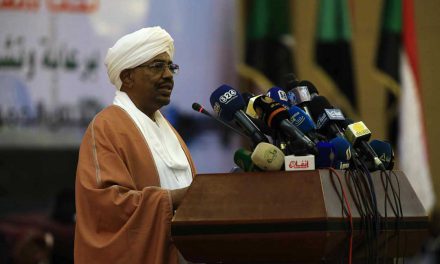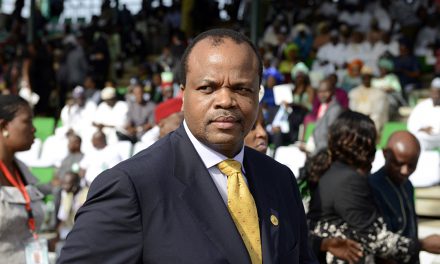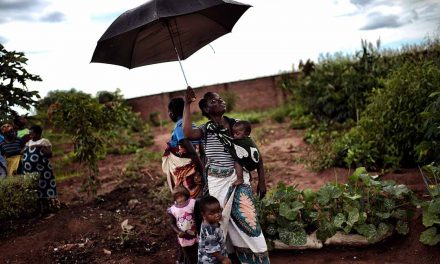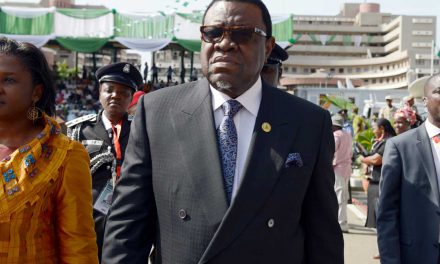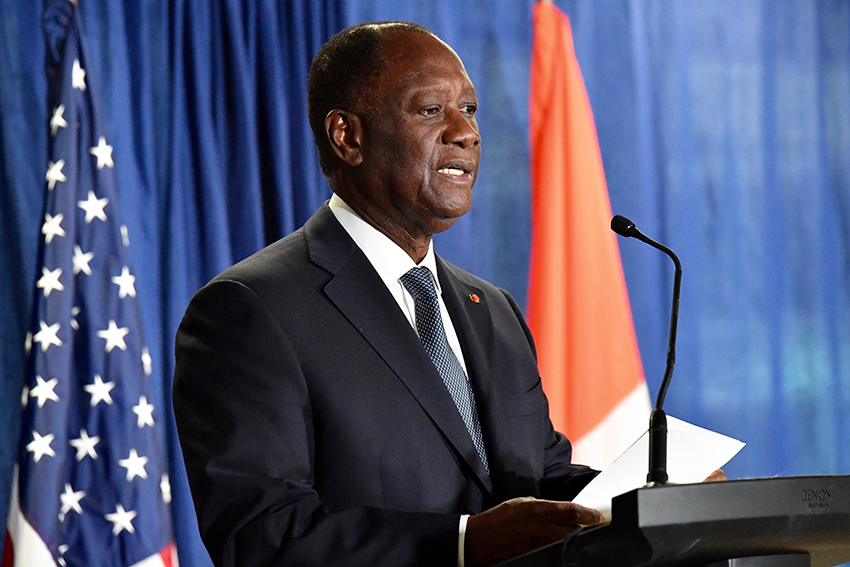
President of the Ivory Coast Alassane Ouattara before signing a new compact to spur economic growth and private investment in Cote D’Ivoire with U.S. Millennium Challenge Corporation CEO Jonathan Nash at the U.S. Department of State in Washington, D.C. on November 7, 2017. Image US State Department/ Public Domain)
Ivorians must decide whether a constitutional amendment is required to deal with ethnicity and citizenship
In October 2016 Côte d’Ivoire will hold a referendum on constitutional reforms. While President Alassane Ouattara perceives this as an opportunity to modernise the constitution, opposition party members have condemned the move as anti-democratic and illegitimate.
The opposition parties’ concerns arise from recent attempts by leaders of other African countries to amend their constitutions to extend their stay in power.
In some instances this has resulted in violence, as exemplified in Burundi in 2015.
Under Ouattara’s leadership Côte d’Ivoire has experienced a period of relatively stable economic growth, and the IMF has described the country’s economic performance as “impressive”. But despite the advances in the economic sphere, ethnic tensions are still a source of vulnerabilities in the country’s politics.
The terror attacks at Grand-Bassam resort in March this year underscored the fragile security situation of a country that is heavily reliant on the presence of UN peacekeepers. However, one of the most crucial issues that Ouattara’s government seeks to address in the constitutional referendum is that of national identity, more specifically Article 35 of the constitution.
Prior to his re-election in 2015, Ouattara promised to amend a citizenship clause in the current constitution that was ratified in 2000 in the aftermath of a military coup led by General Robert Guéï. Article 35 stipulates that a presidential candidate “must be Ivorian by birth, born of a father and of a mother themselves Ivorian by birth” and the candidate must “never have renounced Ivorian nationality nor have had another nationality”.
The nationalistic concept of Ivoirité has existed since immigrants first arrived in the country. After gaining independence from France in 1960 the Ivorian government encouraged immigration from neighbouring countries to augment the labour force for the country’s flourishing cocoa industry. Many migrant workers, most of them Muslim, settled in the northern part of the country.
Since citizenship cannot be granted unless both parents are Ivorians, however, many of the northerners were viewed as foreigners. A decline in the economy in the 1980s led to widespread discrimination against foreigners, including Muslim northerners.
Former president, Aimé Bédié used the concept of Ivoirité to gain support during his presidential campaign in 1995. Ouattara himself became a victim of Article 35 when a court ruled that one of his parents was not Ivorian. Ouattara, who represented a predominantly Muslim north, was disqualified from the election when a court ruled his mother was from neighbouring Burkina Faso. Five years later he was again excluded from participating in the 2000 election against Laurent Gbagbo who accused him of being a foreigner. Article 35 was a catalyst for the civil war in 2002.
The article excluded Ouattara, who represented the predominantly Muslim north, from participating in the election. As a result, a group of largely northern former army officers took control of the north and launched attacks against the government of Gbagbo.
Although the government and the rebels signed a peace accord in 2003, violence continued until 2007 when the two parties signed the Ouagadougou Peace Agreement, which proved to be a more lasting peace deal.
While it led to a cessation of violence, however, the latter agreement failed to address the main issues underlying the conflict. The country remained essentially divided between north and south, and discrimination against foreigners grew, culminating in the post-election violence of 2011.
In addition to amending the citizenship clause, other proposed changes to the constitution include the creation of the post of vice-president, who would deputise for the head of state during his or her absence.
Moreover, if the president were to become incapacitated or die in office, the vice-president would take over and complete the term of the president. Currently the speaker of parliament is second in line to the presidency.
Ouattara says reforms to the constitution should be based on two factors. Firstly, in his view, they should take account of the 2003 Linas-Marcoussis Agreement that aimed to address a number of issues, including the citizenship status of immigrants and their children; land tenure; the reform of the security forces; the disarmament and demobilisation of rebel groups; and questions surrounding the eligibility for election of candidates for the presidency. Secondly, in Ouattara’s view, the reforms must reinforce the rule of law.
These changes will produce “a more coherent and modern constitution”, Ouattara says. Moreover, he has indicated that he does not want changes to the two-term limit.
Political analysts and commentators argue that amending the citizenship clause in the constitution would improve the political system in Côte d’Ivoire ahead of the upcoming elections in 2020. The clause is perceived by many— particularly northerners who have family ties in neighbouring Burkina Faso and Mali—as a political means of exclusion.
Political stability in Côte d’Ivoire will contribute positively towards economic growth and political reconciliation. While it is important for the president to address the issue of citizenship, other challenges such as youth unemployment, wealth distribution, the return of refugees, the security sector and reconciliation need to be addressed.
During his time in office Ouattara has managed to restore the country’s economy mainly by negotiating the cancellation of significant debt, securing increased donor funding and attracting foreign investment. This after the country had experienced two civil wars in a decade. However, there has been little progress in the political, social and security sectors.
Ouattara has managed to restore the country’s economy mainly by negotiating the cancellation of debt, securing increased donor funding, and attracting foreign investment.
Some 46.3 percent of the population were still living in poverty in 2015, as compared to 51 percent in 2011. Clearly inequality is one of the major challenges the government needs to tackle. To address this, programmes that support food security and the improvement of social services are needed, among others.
Political exclusion is another problem that has inhibited Ivorian politics for many decades. One way to address this issue would be to elect a government that is representative of the demographics of the country.
Despite a cabinet reshuffle in January 2016 many key posts in government are still held by northerners. The head of the national assembly, the justice minister, the director of the treasury, the chief of staff and the head of intelligence come from the north.
Some political commentators have suggested that Ouattara’s chief of staff, Amadou Gon Coulibaly, who is from the north, is a favourite for the post of vice-president. To justify his appointments, Ouattara argued in January 2016 that he had appointed the ministers of his cabinet based on promoting consistency.
Reconciliation is another crucial issue that the Ouattara administration needs to address during its second term in office. A first step towards promoting reconciliation would be to deal with the return of refugees—the civil wars had resulted in an exodus of Ivorians. According to the UNHCR there are about 40,000 Ivorian refugees in neighbouring countries including Liberia, Togo, Guinea and Ghana.
Addressing the matter will also have a positive impact on improving the security sector. Recent terror attacks by al Qaeda members have exposed the vulnerability of security in the country.
The government is reportedly planning to address the security issue in the country with the help of UN peacekeepers. Stations for quick response forces have been set up, and the government has joined forces with neighbouring Burkina Faso—which also saw terror attacks in January 2016—to combat terrorism.
In August 2016 two Ivorian soldiers were sentenced to 10 years in prison for their involvement in the Grand-Bassam terror attacks.
It would appear that the government is making some progress toward bringing the refugees home. On July 14, 2016, together with the UNHCR, it announced a plan aiming at the phased return of 40,000 refugees.
Amending the constitution will be a first step towards creating a more politically inclusive Côte d’Ivoire where neither ethnicity nor citizenship constitutes a catalyst for conflict; and the first step of this process rests on the decision of Ivorians in the referendum this October.


